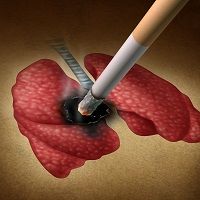Article
Smoking Decreases Immune Response in Patients with COPD
Author(s):
For patients with chronic obstructive pulmonary disease (COPD), cigarette smoke may damage the cellular protein "shredder," known as the immunoproteasome.

For patients with chronic obstructive pulmonary disease (COPD), cigarette smoke may damage the cellular protein “shredder,” known as the immunoproteasome, according to findings published in American Journal of Respiratory and Critical Care Medicine.
Researchers from the German Research Center for Environmental Health examined lungs of human donors, both COPD and IPF patients, in cigarette exposed mice in order to characterize immunoproteasome function in COPD and its regulation by cigarette smoke. Smoke from cigarettes is a primary risk factor for COPD, the researchers explained.
The immunoproteasome, a structure in mammalian cells designed to corrupt foreign protein molecules — like viruses – may not function properly when exposed to such pollution, the researchers believed. The shredded proteins, or peptides, are then exposed to the immune response of the body in order to develop antibodies and a response against the virus.
But smoking, the researchers found, impairs this process. The lungs of COPD patients showed decreased immunoproteasome activity.
“We observed that cigarette smoke reduces the activity of the immunoproteasome in human cells,” first author Ilona Kammerl explained in a press release. “As a result, the presentation of the degraded protein shreds to the immune system does not function properly and thus weakens the specific immune response.”
For their next study, the researchers plan to further examine whether lower immunoproteasome activity may indicate increased susceptibility to viral infections in COPD patients. Further studies may be able to determine if changes in immunoproteasome levels are detectable using blood cell samples and see if there is a link to airway infections. The immunoproteasome could also be a potential therapeutic target, the researchers added.
“COPD patients frequently experience acute worsening of pulmonary function (“exacerbations”) during a viral infection, and often do not completely recover from these,” study leader Silke Meiners highlighted in the statement. “This suggests that the specific immune response to viral pathogens is reduced in COPD patients. Our data provide the first indications that this is due to cigarette smoke-induced reductions in immunoproteasome activity.”




